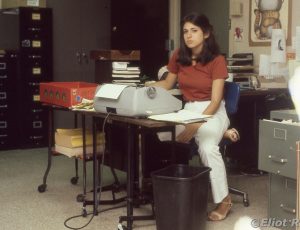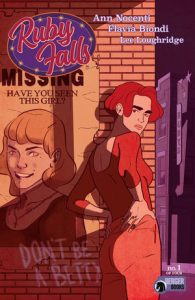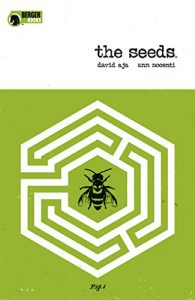Hello, folks and welcome to another installment of Interviews Behind The Marvel Universe! by Nicholas Brown.
Today we’ve got the wonderful Ann Nocenti recounting her days at the ol’ Marvel Bullpen.
Ann was a dedicated Editor and Writer for Marvel comics in the ’80s and ’90s and has since been paving her own way through the industry, making comic books the way she wants and living a very interesting life. She co-directed a documentary in Pakistan called The Baluch.
Among her creations are obscure but delightful Marvel characters such as Longshot, a genetically engineered human with luck based superpowers, and Mojo, a yellow creature that controls an entire alternate dimension with his gruesome TV network.
Nowadays you can find her at Dark Horse Comics writing Ruby Falls, a currently ongoing noir mystery story that examines the lives of three generations of women who solve a murder in a small town. Her 2018 comic series, The Seeds, should be coming to paperback in late 2020.
And now, the woman herself, Ann Nocenti!
Q: What did you do before working at Marvel Comics and do you think that helped prepare you for the job?
Well I was just a kid, really, fresh out of art school. I guess studying film, and being able to draw a bit, helped with understanding visual storytelling. Many entered the field back then from love of comics, but I didn’t read them (beyond some Pogo, Dick Tracy and the “Sunday funny pages” (as they were called when I was little). I loved documentary film and journalism, so I think my viewpoint was a curiosity to see if realistic issues could be folded into comics, at least in the ones I wrote like Daredevil. In other words, I was mostly unprepared and unqualified to work in comics! But I had a series of strong teachers – Jim Shooter (who emphasized basic story principles), Denny O’Neil, (who encouraged me to take a journalist’s approach to comics and gave me my first writing gig), Archie Goodwin (the master of plot mechanics) Louise Simonson (she has endless creativity and instinct for comics) and that’s just a few. I learned by osmosis from everyone — watching Al Milgrom, Larry Hama, Carl Potts and John Romita Sr. work on storyboards, Mark Gruenwald’s guidance in writing my first series Spider-Woman, and just about everyone working hard in the bullpen. Especially Marie Severin, who I was intimidated by but I had a hero worship of her, and was thrilled when we did a comic together. So, to answer your question, I joined Marvel as a clueless kid but was lucky enough to be mentored by many!
Q: What has life been like after Marvel?
I left Marvel to try journalism and filmmaking. I had a decade or so of doing that, wrote for magazines, wrote screenplays, was the editor of a film magazine called “Scenario,” got a film made, made a few documentaries, taught film in Haiti and other places. I mentored many young Haitian filmmakers, and maybe that mentoring was a natural step after having so many mentors at Marvel.
Then I came back to comics. I did a few comics for DC, but I always wanted to try writing comics without super-heroes, so I did that for Karen Berger’s new imprint at Dark Horse, “Berger Books.” At first it was scary, because super-hero comics have the buttress of an escalation narrative and a ready-made, beloved, iconic character that readers are willing to follow. This was more like freefall, but freefall with one of the best editors in the business, Karen Berger. And I still work for Marvel in a way, as for the past few years I was one of the producers on an 80-year history of Marvel traveling exhibition called “Marvel: Universe of Super Heroes” that will travel the country for another 5 years.
Q: You recently wrote a comic series titled The Seeds that follows a journalist chasing a story through a dystopian country with aliens and missing bees. That is a pretty surreal story from what I’ve seen, how did you come up with that sort of a tale? It seems, at least on face value, rather different than your previous outings I’m more familiar with from Marvel.
To tell a new story, I usually look around the world and see what resonates with me. So “The Seeds” (with artist David Aja) took a bunch of my obsessions, like, How can you tell a story that is really true? What is this love/hate feeling I have for my tech? If the world did collapse from some kind of “event,” how would people behave? “The Seeds” explores those questions. It was similar with my latest comic “Ruby Falls” with artist Flavia Biondi, for Dark Horse/Berger Books — that story deals with storytelling in a way, in that every time we tell a story about ourselves it drifts further from the truth. Can we trust our own memories? Ruby Falls is a neo-noir murder mystery set in a small town. It’s a non-superhero comic by women, about women, for women — a set-up that pretty much guarantees low sales, but I never did have much of a head for business and it was a joy to make that comic.
Q: Is there anything you miss about the old comic industry compared to the way things are now?
Well, I think if you spoke with anyone who worked at Marvel in the 1980s, it was a very special time that we all miss. That was 30-plus years ago, so kind of impossible to put in a real context, as memory is so flawed, but I think we were aware that it was an amazing gig and atmosphere, and yet it was only after getting out into the “real” world that we maybe realized how dang amazing early Marvel was. I guess it was like a garage band or something, anyone who was around picked up an instrument and played, and in that way the we all jammed at making comics together and had a blast doing it, and didn’t think about the future too much. This was pre-internet, so you could hide in a little pocket of the universe and jam away at something without thinking too much of what “the world” thought. The internet has made us all aware of “the world” in a kind of annoying way.
Q: What are some particularly fond memories of the old Marvel Bullpen?
We all worked very hard, so mostly I remember hiding in my office trying to get through a mountain of scripts and art to get the books out in time, and endless story conversations with writers as we banged out plots together, but that hard work was broken up by crazy moments, many I think instigated by Mike Carlin and Mark Gruenwald — like their cable TV show. I was a willing participant when asked, but mostly just a shy voyeur type who was grateful for the shenanigans they did to break up the days. There were so many unsung heroes there. Like Danny Crespi, whose belly I’d rub for good luck getting the books out in time, and Morrie who would squeeze my fingertips, study the color of my fingernails, and tell me what foods I should be eating, and Virginia Romita’s total whip-snapping control of all of us. Sometimes I think we only got all those comics out because of her skill as traffic manager.
Q: Do you have a good embarrassing or funny story you have about my father?
There were so many cut-ups and hilarious humans at Marvel back then, it was a bit intimidating, but under the jokes there was always kindness. Eliot was one of the best, and as we know now, prescient in that he archived the Marvel offices and Bullpen with his skill at photography. His archive is full of treasures, and it is great that Marvel recognizes that, and we all love his blog and look forward to the next one. I very much look forward to a book some day with all Eliot’s memories and photos of the old days at Marvel. Especially because the memories are fading, and when I see one of his photos, I get great flashbacks to an era I’m sadly forgetting!
Thank you Ann Nocenti! Don’t miss Ruby Falls and The Seeds


